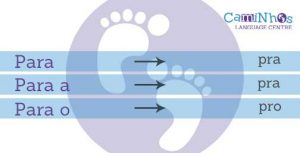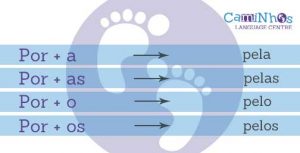Blog
Differences between Por and Para in Portuguese | Lesson 14
- Monday July 29th, 2019
- Posted by: Guest
- Category: Learn the Portuguese Language and Portuguese Grammar

One of the biggest difficulties people have when learning Portuguese is to understand the difference between prepositions Por and Para. Let’s see how to use each of them and check examples to help with our doubts.
Table of Contents
TogglePara
1) Goal, objective
Eles estão na Caminhos para estudar. (They are at Caminhos to study.)
2) Final destination, direction
Ele está indo para casa. (He is going home.)
3) Opinion
Este assunto é muito importante para mim. (This subject is very important to me.)
4) Deadline
O dever de casa é para amanhã. (The homework is due tomorrow.)
We also use ‘Para’:
Dar para (Give it to)
Example: Ele deu um livro para ela. (He gave a book to her.)
Alugar para (Rent it to)
Example: Eu aluguei o apartamento para o Derek. (I’ve rented the apartment to Derek.)
PARA ► Indicates the person who is receiving something. It can be a good or bad thing.
Ps: In informal language, it is very common to use ‘pra’ instead of ‘para’. But ‘pra’ and ‘para’ the same meaning.
Examples:
Eu vou pra escola todos os dias = eu vou para a escola todos os dias (I go to the school every day.)
Eu vou pro museu hoje = eu vou para o museu hoje. (I will go to the museum today.)
► The word ‘museu’ is masculine, so we use para o/pro.
 Os alunos fizeram um passeio para o Jardim Botânico.
Os alunos fizeram um passeio para o Jardim Botânico.
(The students went on a trip to Jardim Botânico.)
—
POR
1) Time period
Ele vai ficar no Brasil por três meses. (He is going to stay in Rio for three months.)
2) Approximate time
Mariana vai chegar lá pelas 10h. (Mariana is going to arrive around 10am.)
Por + as = Pelas
3) Route
O ônibus passa pelo centro da cidade. (The bus goes through downtown.)
Por + o = Pelo
4) Exchange and money
Naiara comprou uma caneta por R$2. (Naiara bought a pen for 2 reais.)
Você pode trocar a caneta pelo lápis? (Can you Exchange the pen for the pencil?)
POR + O = PELO
POR + OS = PELOS
POR + A = PELA
POR + AS = PELAS
We also use ‘Por’:
► Ele fez o trabalho por você. (He did the job for you.)
► Ele está no Brasil por causa da namorada. (He is in Brazil because of his girlfriend.)
► Rodrigo segurou o amigo pela camisa. (Rodrigo held his friend by his shirt.)
► Quanto é 72 dividido por 9? (How much is 72 divided by 9?)
► O livro foi escrito por um escritor famoso. (The book was written by a famous author.)
► O livro foi escrito pelo Paulo Coelho. (The book was written by Paulo Coelho.)
► Obrigado pelas aulas! (Thank you for the classes.)
► Obrigado por tudo! (Thank you for everything.)
 O aluno trocou a bola velha por uma nova.
O aluno trocou a bola velha por uma nova.
(The student exchanged the old ball for a new one.)
Homework
Now it’s time to practice.
1) Eu vou _________ a praia no domingo. (I will go to the beach on Sunday.)
2) Você trocou a camisa _________ outra? (Have you changed the shirt for the other one?)
3) Alex pagou R$100 _________ quadro. (Alex paid R$100 for the painting.)
4) A professora dividiu 10 _________ 2. (The teacher divides 10 by 2.)
5) Jennifer está aqui _________ estudar português. (Jennifer is here to study Portuguese.)
6) Carlos não vai sair _________ causa da chuva. (Carlos won’t go out because of the rain.)
7) Manuel vai chegar lá _________ 23h. (Manuel is going to arrive there around 11pm.)
8) Ele comprou flores _________ ela. (He bought flowers for her.)
9) Não podemos ir _________ o cinema. (We can’t go to the movies.)
10) Quero ir _________ a Lapa _________ caminho mais curto. (I want to go to Lapa by the shortest route.)
Answers
1) Para
2) Por
3) Pelo
4) Por
5) Para
6) Por
7) Pelas
8) Para
9) Para
10) Para/Pelo
Check other Portuguese lessons online at Caminhos Blog clicking here.
Study Portuguese at Caminhos Language Centre and experience Rio de Janeiro. Caminhos can also help you with Student Visa for Brazil and Homestay in Rio de Janeiro.


 Deutsch
Deutsch Français
Français Português
Português Español
Español



Eu gosto muito disso…???